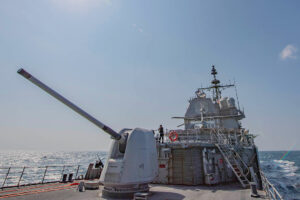By Kyle Aristophere T. Atienza, Reporter
A POSSIBLE Chinese invasion of self-ruled Taiwan would be a litmus test for US commitment to its security allies including the Philippines, according to experts.
“The Taiwan Strait conundrum would challenge the regional interoperability and deterrence posed by the US and its allies including the Philippines to China,” said Chester B. Cabalza, founding president of Manila-based International Development and Security Cooperation.
“It is a litmus test of the heightened power competition between China and the US,” he said in a Facebook Messenger chat.
The Philippines has a 1951 Mutual Defense Treaty with the US, which has vowed to defend Taiwan in the event of an attack by China.
China claims Taiwan as a province and Xi Jinping, who secured a historic third term as Chinese president in October, has not ruled out the use of force regarding the self-ruled island.
Washington is expanding its training of Taiwanese forces, planning to deploy more American troops to the island-nation.
Earlier this month, President Tsai Ing-wen told visiting US lawmakers Taiwan would “cooperate even more actively” with Washington and other democratic partners, on issues such as authoritarian expansionism and climate change.
“If tensions escalate in Taiwan, the Philippine-US Mutual Defense Treaty could be invoked, since Filipinos in Taiwan will become vulnerable,” Mr. Cabalza said.
He added that military bases in northern Luzon would play “pivotal roles” in Washington’s prepositioning of military equipment, aircraft and vessels.
“The simulated operations of evacuating Filipinos from Taiwan conceived in military exercises should be realized.”
The government of President Ferdinand R. Marcos, Jr. has given the US access to four more military bases under their Enhanced Defense Cooperation Agreement (EDCA).
The two countries have yet to disclose the locations of the new EDCA sites but last year, a former Philippine military chief said Washington had requested access to bases on the northern land mass of Luzon, the closest part of the Philippines to Taiwan, and on the island of Palawan, facing the disputed Spratly Islands in the South China Sea.
Once China invades Taiwan, “all the American treaty allies in the Asia Pacific will be embroiled in the war in different degrees of influence, including the Philippines,” said Emerson De-Yi Zhou, a research assistant at the Center for Foreign Policy Studies at the National Chengchi University in Taiwan.
‘ROPED INTO ALLIANCES’“The US will respond first and possibly send troops to intervene, and require its allies such as the Philippines to provide military support, mainly on the logistical side,” he said via chat.
The potential war could indirectly affect the Philippine economy,” he said, citing a war simulation conducted by American think tank Center for Strategic and International Studies in January.
Chinese threat to the Philippines’ national security would be more alarming if China wins the war and manages to control Taiwan, Mr. Zhou said.
If tensions escalate, the US could impose economic sanctions on China, and the Philippines would likely be required to do so too, he added.
Still, Mr. Zhou thinks Chinese invasion of Taiwan is “unlikely in this decade.” He expects the Marcos government to continue calling for a peaceful settlement of the China-Taiwan conflict.
Mr. Marcos would probably hedge its foreign policy strategy by boosting security ties with the US while keeping economic relations with China, he said.
The US has no formal diplomatic ties with Taiwan, but the two countries have “a robust unofficial relationship,” according to the US Department of State. Washington supplies arms to Taiwan.
The Philippines still adheres to the One China policy, which China has used to assert that Taiwan is part of its territory, Mr. Marcos said on the sidelines of the United Nations General Assembly in New York in September.
He urged “all parties involved to exercise maximum restraint.” “Dialogue and diplomacy must prevail.”
“The Biden administration will be OK with the Marcos government’s stance,” Mr. Zhou said. “After all, the national security strategy report of the Biden administration mentions that the US will support its allies’ sovereign decision-making capabilities based on their own interests and value.”
He also said US Secretary of State Anthony Blinken had said the US would not force its allies to take sides.
If China becomes more aggressive in the Taiwan Strait, the Philippines would likely be “roped into alliances,” said Hansley A. Juliano, a political economy researcher studying at Japan’s Nagoya University’s Graduate School of International Development.
“You can either see the US increasing its presence or it will pressure allies such the Philippines to invest more in defense,” he said in a Messenger chat.
“The high risk here is it will likely enlarge US foreign military engagement abroad, which is already causing headaches with Joe Biden’s recent engagement in Ukraine.”
He said worsening tensions between China and Taiwan would probably result in supply chain disruptions, which might force the Philippines to enter into “unequal economic ties with Beijing.”
